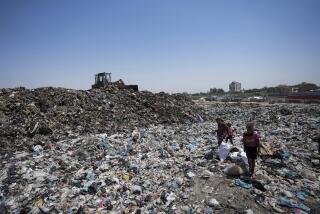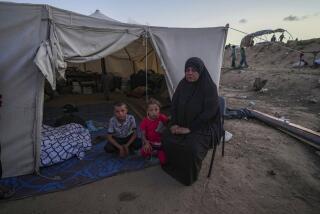Arafat Comes Home to Gaza and Its Everyday Problems : Mideast: Low-key welcome marks PLO leader’s return. Development is his top priority.
GAZA CITY, Gaza Strip — After a quarter-century of campaigning around the world for Palestinian independence, PLO Chairman Yasser Arafat came home Tuesday to a water shortage, uncollected garbage, power cuts, snarled traffic, a sluggish bureaucracy and all the other problems of a developing country.
Unlike his triumphant return to the Gaza Strip two weeks ago as the head of the new Palestinian Authority, this homecoming was low-key, a settling down to make the historic pact on Palestinian self-government work and improve Palestinians’ day-to-day lives.
“Now, the hard work begins!” a banner across one of Gaza City’s main streets said in its welcome to Arafat. “With our spirit, with our blood, we will build Palestine!”
“The pressure for results is on us now,” Zakaria Agha, the Palestinian housing minister, said as he waited for Arafat’s motorcade to arrive from El Arish, Egypt. “People expect a lot of us, and they will be patient only to a point. . . . The success of this whole effort, the success of peace in the Middle East, really depends on how well we govern in the days ahead.”
That turns in large part on Arafat’s conscious transformation of himself from a guerrilla commander so security-minded that he slept in a different bed each night and wore his Smith & Wesson revolver even around the house, into the head of the new Palestinian government, with economic development his top priority and an open door to his people.
When reporters questioned Palestine Liberation Organization spokesman Marwan Kanafani on Tuesday about Arafat’s continued dress in an olive-drab military uniform and the much-discussed “militarization” of the Palestinian Authority, Kanafani replied, “When you look at his holster, you miss the briefcase, and in the briefcase are the plans for Gaza’s economic development. . . .
“The struggle for Palestinian independence has always been fought on many levels, in many arenas, on many battlefields,” he added, “but we are very clear that the place today is Gaza and the crucial test will be jobs. We know this, and it is our priority, our top priority.”
Whether assessed by unemployed Palestinians in Gaza’s squalid refugee camps or by local leaders of Fatah, Arafat’s own mainline group within the PLO, the verdict was the same--Arafat’s return was a milestone in the struggle for Palestinian independence, but the economy will determine ultimate success or failure.
“We have to concentrate on improving conditions for the people of Gaza first and foremost,” Arafat was quoted as telling his Cabinet on Tuesday. “Our focus must be on sewage, on jobs, on housing--the things that have impact on people’s lives--and tell them that this is their government, working for them.”
But also on Arafat’s immediate agenda were political questions--settling the incessant feuding among PLO factions, developing a strategy for negotiations with Israel on the next phase of the autonomy plan and not becoming a much devalued mukhtar, or mayor, of Gaza.
*
“Abu Ammar must not lose patience with the business of governing,” Gaza businessman Eyad Amoudi, 56, said, using Arafat’s nom de guerre. “We need him here, on the spot, supervising everyone, overseeing everything. No one else commands the same respect--even if they are better managers.
“What I fear is that he will get bored with little Gaza,” he said. “This is a man who has traveled the world, who meets with heads of state and goes to the United Nations. And what do we present (to) him on his first day of business here--power cuts, a water shortage, dirty streets. . . .”
An Israeli analyst of Palestinian politics, commentator Oded Granot of the popular newspaper Maariv, observed that governing one of the most deprived places in the world and making a success of it in order to drive the peace process forward would probably be Arafat’s most difficult challenge. “These will be tests in front of a Palestinian public that is waiting for instant results--and for which the alternative is the sharpening of the knives,” Granot said.
Every Arafat move will be assessed, particularly by his Palestinian and Arab critics, to see whether he was right in agreeing to autonomy for the Gaza Strip and the West Bank town of Jericho, and he is likely to be embarrassed again and again by the controls that Israel has retained on the Palestinian Authority.
*
“Even his comings and goings must be approved by the Israelis,” a young man said as Arafat’s motorcade arrived. “He says we need Israeli cooperation and goodwill, but they still have us by the throat.”
Arafat advisers argue, however, that Israel’s need for a Palestinian success--particularly the need of Prime Minister Yitzhak Rabin--is no less than that of Arafat.
In Jerusalem, Israeli Foreign Minister Shimon Peres agreed that Arafat’s most pressing problem is rescuing the Palestinian economy, especially in Gaza, where unemployment runs an estimated 60% to 80%.
On Monday, Arafat left Tunis, Tunisia, his headquarters for 12 years, and traveled via Cairo with his wife, Suha, some of the Palestinian orphans he has adopted and a small retinue of aides. At the dusty Rafah border crossing from Egypt into the Gaza Strip, he was met by Agha, Justice Minister Freij abu Midan and Maj. Gen. Nasser Yusuf, the Palestinian police commander. Small groups gathered along the road to cheer, but there were no real celebrations.
Arafat has declared he intends to reside permanently in the Palestinian territories, alternating between Gaza City and Jericho. Aides said, however, he would continue to travel abroad to raise money and campaign for greater Palestinian autonomy in the rest of the Israeli-occupied lands and eventual independence.
More to Read
Sign up for Essential California
The most important California stories and recommendations in your inbox every morning.
You may occasionally receive promotional content from the Los Angeles Times.










